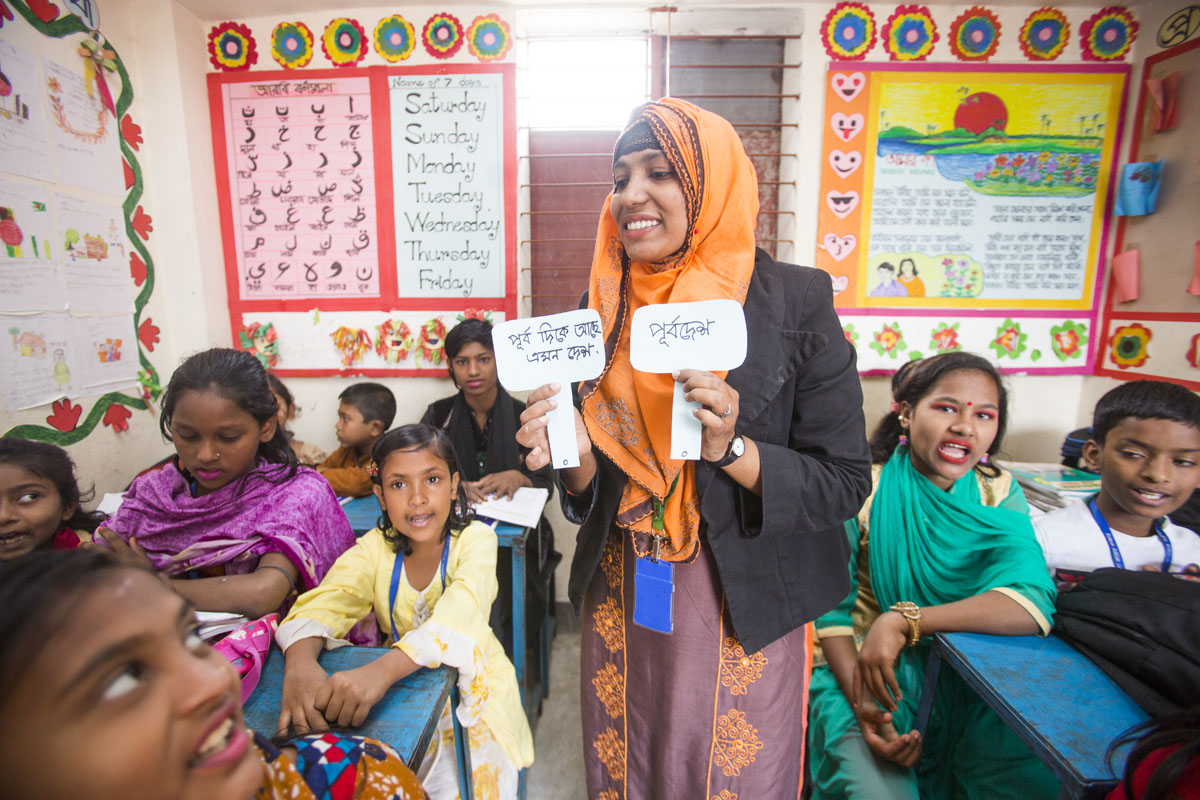
COVID-19 has meant a huge challenge for teachers. Over the last few months, teachers have had to adapt their work almost overnight and they are now managing this new reality with numerous difficulties, but also with a high level of personal commitment. They give classes online and share tasks using social media or applications like WhatsApp. They even go to the houses of those who cannot get online to give them the materials they need. They are doing everything they can so that children can continue to learn, even if that means working outside their normal working hours and using their own financial resources.
To mark World Teachers’ Day, we want to ask governments to give more support to teachers, in order to face the new challenges posed by COVID-19. As explained by our global head of Education, Mikel Egibar, “teachers cannot bear all the responsibility alone. Guaranteeing the right to education is the duty of governments. They should therefore support teachers, and provide the necessary training and resources so they can do their job. If not, the right to education for many children is at risk, especially those who are in more vulnerable situations”.
Maintaining educational quality and supporting students emotionally are the challenges for this new school year.
It is estimated that at the worst point of the global pandemic, school closure affected 63 million primary and secondary teachers, and 1500 million students of all different levels, according to UNESCO data. Both during the previous months and now, they have continued their educational work, but on top of that they have had to manage the effects of the global pandemic on children.
It is not just about ensuring that hygiene measures are followed in the classroom if the school is open. Teachers are also supporting children emotionally. Let’s not forget that the students have lived through months of confinement or mobility restrictions and are now anxiously watching the economic crisis caused by the pandemic unfold, which often affects their own families.
That is why, at Educo, we think that teachers must be given full recognition for their role during the pandemic and during these uncertain times, since in addition to facing the same difficulties as the rest of society, they have continued to work to guarantee the right to education of children, especially the most vulnerable.
This is our little tribute to all teachers using pictures drawn by children from around the world in which they express how much they appreciate their teachers.
Additionally, teachers from around the world who we work with have shared with us what it means to them to be teachers and what they have experienced and are experiencing during the pandemic.
BANGLADESH, JESMIN
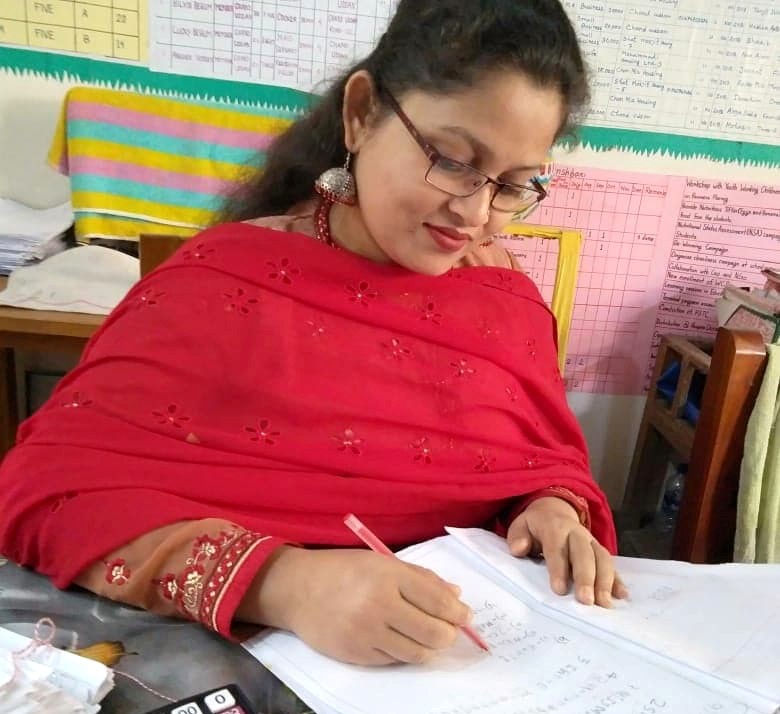
“Like everyone, I also dreamed of becoming someone important when I was a girl. In my case, my teachers where the people that contributed the most to my decision. Educo has supported me since I was in primary school, through secondary school and up until university. In 2013, when I was a student, I applied to be a teacher with Educo due to my family’s debts. In no time at all, my dream also came true. Educo appointed me as a teacher and offered me various training options to improve my teaching skills.
Working closely with young students, listening to their problems, their feelings, their joys; these always help me learn new things. My relationship with my students goes beyond just being a simple trainer, I also consider myself their friend. I listen to them attentively and apply various strategies so that their education is enjoyable for them. That is why my students love me so much. They also share their personal and family problems with me. My connection with them is more like that of a friend than a teacher.
The COVID-19 situation has become a challenge for us because we can’t work directly with our students. I am proud to work as a teacher, because teachers are the architects of a nation”.
PHILIPPINES, MIRANDA

For Miranda being a teacher is much more than a job, it is a way of life. “Teaching children is hard work, but the feeling is simply rewarding and inexplicable. Even during confinement, I missed and longed to spend time with my students. They mean a lot to me; they are not just my students. I fell that my role goes further than just a simple teacher, especially with those who have difficulties learning to read. I try to guide them much more.
Through the Educo reading programme I learned that a child needs to be ready. You can’t force a child without developing his or her interest, you have to help them to develop that first. I also realised that there are children that flourish later. Without interest, we cannot force a child to learn.
The challenge is: What can we do without face to face learning? How can we reach that child? Can children really learn? What happens if the parents don’t know the lessons themselves? This is a huge challenge for us.
Our only dream as teachers is that the students learn from us, through us. It is a huge honour and a huge achievement when that happens”.
INDIA, AMIT

“I am an English teacher because even as a small boy it was my favourite subject and that was when I learnt what errors I needed to avoid. A few years ago, a gentleman decided to give a large sum of money to our school. The head teacher arranged a meeting with all the teachers in order to decide how to make the most of the donation to help our students. I remember suggesting that the money should be used to buy a computer and a projector for the school. That was my first attempt at using technology for teaching. I was one of the youngest teachers in the school at that time. We developed projects alongside the students which were appreciated by the whole school. I remember that my students were so intrigued and enthusiastic about this new way of learning that they started working even harder in my classes.
I find teaching really satisfying. I really enjoy teaching the students who come to the night schools. Their eagerness to learn and their ability to work so hard, despite working during the day to support their families, is admirable”.
MALI, ANNE

“I decided to become a teacher because I have always loved the teaching profession and I also wanted to be in contact with children. The challenges I faced before COVID-19 were the overwhelming number of students and especially the difficulty of attending to all the students at the same time. I treat my students like my own children and they see me as a mother. With me, the students feel comfortable and express themselves freely.
With the reopening of schools, we want to do our best to be able to finish the whole school programme. Also, we constantly advise the students to respect the measures for preventing COVID-19. I am worried about the future of the children, and that is why I keep teaching despite the pandemic. I encourage students to double their efforts to make up for the time lost due to teacher strikes and the coronavirus pandemic”.
GUATEMALA, ANA MARIA
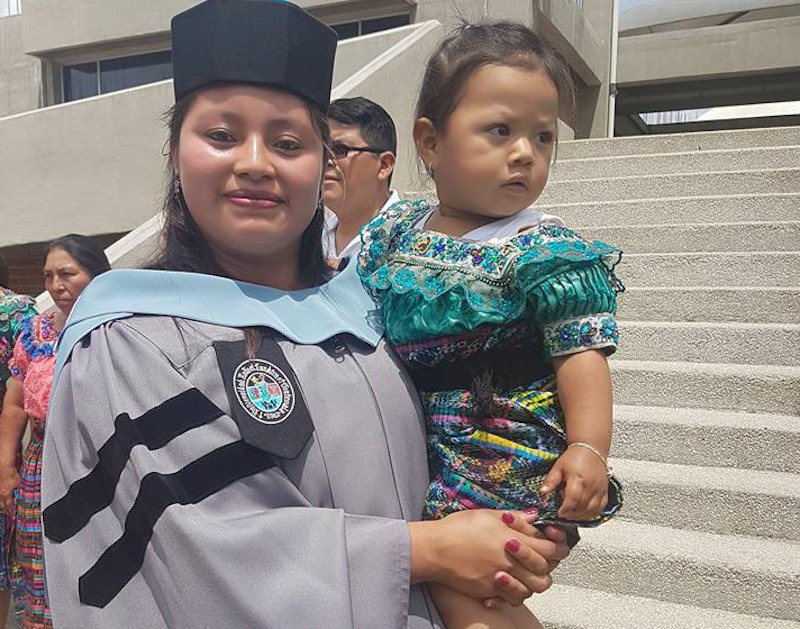
“I love teaching, children and young people. In this profession, I get to help lots of children and communities to see the reality we live in, where there is no equity or fairness, that’s why I decided to contribute to helping people become aware and change their realities through education, because I know that this profession is one of commitment, above all of vocation. Through my profession I can contribute to the education of children, adolescents and their parents to transform Guatemala into a better place.
The pandemic was a challenge to us as teachers. The biggest question now was what will happen to the students? How am I going to teach my classes? As a teacher one is used to implementing playful, popular education methodologies that involve teamwork and when the pandemic came, we asked ourselves, now what are we going to do?
I could not imagine sending a worksheet to my students without knowing if they were going to understand or not. That was traumatic, for them as well. However, we looked for opportunities and options to face up to this situation which nobody expected. It was a huge challenge, mainly for our students. It was a difficult experience, considering everyone’s health”.
BOLIVIA, SANDRA

“As a little girl I lived in a school because we didn’t have anywhere to live. The caretaker of the school took us in and my mother and I helped her with the cleaning of the classrooms. Since I was a child I used to watch teaching and when it was a holiday, in the empty classrooms, I played at being a teacher and that is how I grew to like it. I lived in the school until I was a young person, I graduated and after a few years I achieved it.
I love interacting with my children, I forget everything else when I am in the classroom with them: their stories, their thoughts, their mischief, everything they do and say motivates me to keep giving more of myself as a teacher. We think that as adults we are the ones who give examples of values, but it is not true, they are the ones who, in their innocence, show us how we should act and live with our fellow human beings and our environment.
I have a strong connection with them, I notice when one of them is going through a difficult situation at home, without them telling me I can tell what is wrong, I can feel it just like they can when I have a problem at home, when they show me their work they say “I love you”, or ask me questions like “what’s the matter?” and other questions which make me realise that they can feel my emotions, even though I always try to hide them. Ever since the pandemic arrived, every night I think about how to reach each of my students, I imagine lots of activities I can do with them”.
BURKINA FASO, SEYDOU

“Before the pandemic I had a large number of students at school, no class had less than 100 students. That is a difficulty. There is also a lack of ongoing training in the field to update the knowledge of the teachers and we don’t have many teaching materials in some classrooms.
But despite the difficulties, I feel very proud to see my students succeed. I know that in 15 years of service I have had the opportunity to see my students enter the workforce, who are police offices and teachers like me, and I think that is the pride of this profession.
COVID-19 has totally changed my study plan. I like to teach large classes, with lots of students, and of course that is no longer allowed. Children in rural areas are the ones who have had the worst time because in the cities there is the option of finding a tutor to help keep up with their studies, but in villages that option does not exist, and many children have forgotten what they had learnt”.
EL SALVADOR, DINORA
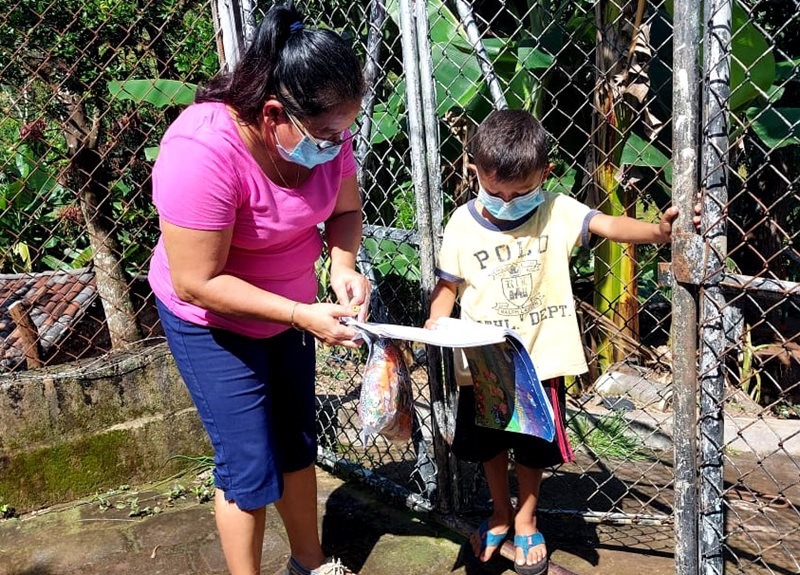
“I am a primary school teacher and what I like the most about this profession is teaching to read and write. I have a lot of patience and I dedicate a lot of time to them, until they learn. That is what makes me happiest and is one of the greatest satisfactions I have had in my life as a professional.
This pandemic has meant a huge challenge for us. At the beginning, we were unable to find a way to communicate with the children. Because I am a teacher in a place far away from the city and there is no internet and the families do not even have money to buy credit for their phones. The only option I decided was viable was to call them and take them the study guides. It was an expense for me, but I didn’t have another option. In the end, it worked and that is how we have been working. For us the use of special platforms did not work because we are working in contexts with high levels of poverty and without access to anything.
I dedicate a half an hour phone call to each student to be sure that he or she has understood the study guide. For the children who cannot receive the calls, because they don’t have a telephone or there is only one for the whole family, what I do is I take the study guides to their schools or homes.
The worst thing for me is when I get to a child’s house and he or she wants to hug me. It’s has happened, and I have had to say no. Now I try to not get too close when I arrive, but they always want to show their appreciation and because they are quite little they always want to show their affection”.
SPAIN, NEKANE

“I decided to become a teacher because I like the idea of working with children, they are the motor of society. What I like the most about my job is that I have the opportunity to help children to enjoy every situation, even if it looks complicated, and to overcome difficulties with a positive attitude; to learn to work hard, to work together as a class.
During the pandemic, I tried to help the children not feel scared, to enjoy the joy and the serenity within the situation. I try to be aware of the emotional wellbeing of each student, by trying to understand their nervousness or sadness, and trying to help them collaborate patiently and alongside society in order to beat the virus. Which is why we talk, I listen to their stories… I try to be even more attentive so that the children are excited about what they are working on in class; that’s why I look for a range of different activities.
While teaching online I carried out various activities like reading jokes which they then had to learn and share with their families; writing the lyrics to songs, learning them and singing them all together; writing messages to their classmates or a written activity which involved each of them expressing what they like and disliked about the pandemic.
Thinking about their needs motivates me to be creative. Knowing that I can contribute to helping them become free citizens, and most of all, happy ones”.


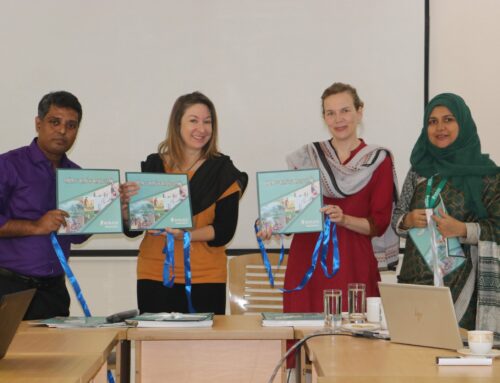
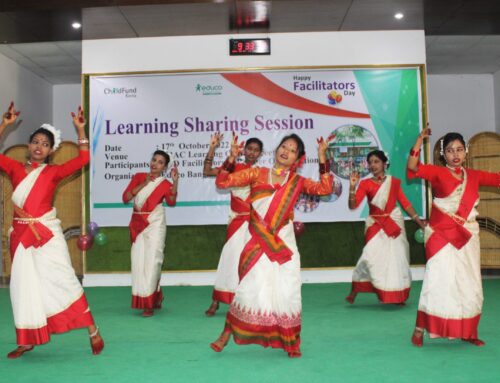
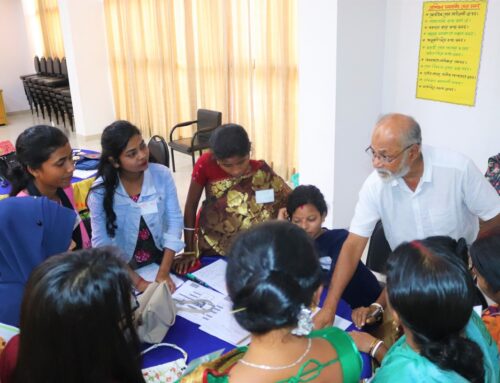

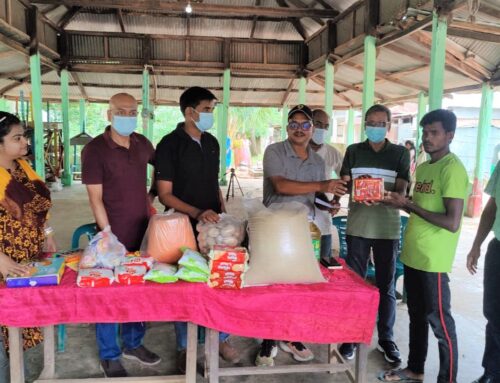
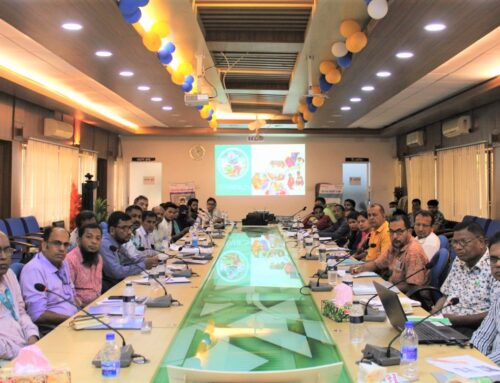
Leave A Comment